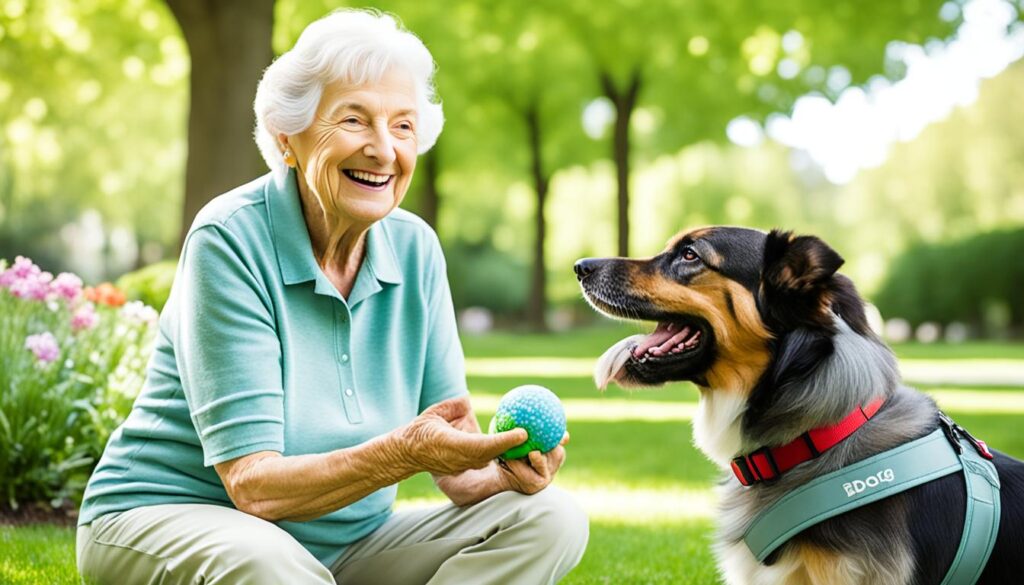Owning a dog can have a profound effect on your overall well-being. It’s not just about companionship; scientific studies show that dogs can improve both your physical and mental health. From lowering stress and anxiety levels to enhancing cardiovascular health, the advantages of having a dog go beyond the happiness they bring to our lives.
Key Takeaways:
- Owning a dog can reduce stress, anxiety, and depression.
- Dogs promote cardiovascular health and can help lower blood pressure and cholesterol levels.
- Playing with a dog increases serotonin and dopamine levels.
- Dogs provide companionship and can alleviate feelings of loneliness.
- Dogs encourage exercise and an active lifestyle, benefiting both the dog and the owner’s physical health.
Dogs Improve Physical Health
It’s no secret that owning a dog can bring immense joy and companionship. But did you know that dogs can also have a positive impact on your physical health? Numerous studies have shown that dogs can help improve cardiovascular health, lower blood pressure, and reduce cholesterol levels.
Research has indicated that dog owners have lower blood pressure, triglyceride, and cholesterol levels compared to those without pets. This may be attributed to the active lifestyle that comes with owning a dog. Taking your furry friend for regular walks and engaging in playtime can increase physical activity, leading to improved cardiovascular health.
“Playing with a dog can increase serotonin and dopamine levels, leading to relaxation and reduced stress,”
Not only do dogs encourage physical activity, but they also provide a source of emotional support, leading to reduced stress. Playing with your dog can increase serotonin and dopamine levels, neurotransmitters that promote relaxation and a sense of well-being.
In fact, studies have shown that heart attack patients who have pets tend to have better survival rates. The presence of a dog provides emotional comfort and support during recovery, contributing to improved health outcomes.
The Health Benefits of Owning a Dog – A Closer Look
Let’s take a closer look at the specific ways in which dogs can improve physical health:
| Benefits | Description |
|---|---|
| Lower blood pressure | Pet owners, especially dog owners, tend to have lower blood pressure levels, which can help reduce the risk of cardiovascular diseases. |
| Improved cardiovascular health | The physical activity involved in walking and playing with a dog can help strengthen the heart and improve overall cardiovascular health. |
| Lower cholesterol levels | Dog owners have been found to have lower cholesterol levels, which can reduce the risk of heart disease. |
Overall, dogs not only bring joy and companionship into our lives but also play a significant role in improving our physical health. From lowering blood pressure to reducing cholesterol levels, the presence of a furry friend can have a positive impact on our well-being.
Dogs Boost Mental and Emotional Well-being
Dogs are known to have a positive impact on mental and emotional well-being. The companionship of a dog can provide comfort and a sense of security, reducing feelings of stress, anxiety, and loneliness. Spending time with a dog can have an uplifting effect on mood, bringing joy and happiness.
Studies have shown that dogs can help reduce symptoms of depression by providing a sense of purpose and unconditional love. The presence of a dog can also help alleviate anxiety, promoting a sense of calmness and relaxation.
“Having a dog has made a tremendous difference in my life. My furry companion has brought so much joy and happiness, and I can’t imagine life without him.” – Sarah, dog owner
Dogs promote playfulness, encouraging their owners to engage in activities that increase mental stimulation and promote overall well-being. Playing fetch, going for walks, or simply spending quality time together can improve mood and boost mental health.

Dogs and Loneliness
One of the significant benefits of owning a dog is the relief it provides from loneliness. Dogs offer companionship and unconditional love, providing a sense of belonging and reducing feelings of isolation.
According to a study published in the Journal of Aging and Health, older adults who own dogs tend to experience less loneliness and a stronger sense of purpose. The daily routine and responsibility of caring for a dog can give older adults a renewed sense of vitality and improve psychological well-being.
- Companionship
- Unconditional love
- Relief from loneliness
Owning a dog can be particularly beneficial for individuals who live alone, as they offer constant companionship and emotional support. The bond between a dog and its owner can be incredibly strong, providing a source of comfort during challenging times.
The presence of a dog in the home can create a positive and nurturing environment, promoting mental and emotional well-being for the entire family.
Dogs Encourage Exercise and Active Lifestyle
Dogs are natural motivators when it comes to exercise. Dog owners are more likely to engage in regular physical activity, such as walking, running, and playing with their pets. Regular exercise not only benefits the dog’s health but also improves the owner’s cardiovascular fitness, muscle strength, and overall fitness levels. Dogs provide companionship and a reason to get outside and be active, leading to a more active lifestyle.
Walking is one of the most common forms of exercise that dog owners engage in. It not only benefits the physical health of both the dog and the owner but also provides an opportunity for bonding and social interaction. According to a study published in the Journal of Physical Activity and Health, dog owners are 34% more likely to meet the recommended levels of physical activity compared to those without dogs.
Playing with dogs also encourages physical activity. Whether it’s playing fetch, running around in the yard, or participating in agility training, these activities require movement and can help burn calories. They provide an enjoyable way to stay active and keep both the dog and the owner engaged.
“Having a dog encourages me to get outside and be active. Whether it’s going for a walk or playing fetch, my dog keeps me moving and helps me maintain an active lifestyle.” – Jessica, dog owner
In addition to the direct physical benefits, regular exercise with dogs has been shown to have a positive impact on mental health as well. Physical activity releases endorphins, which are known as “feel-good” hormones, leading to reduced stress and improved mood. It can also help alleviate symptoms of anxiety and depression.
To illustrate the impact of dogs on exercise and an active lifestyle, consider the following table that showcases the average daily exercise time of dog owners compared to non-dog owners:
| Average Daily Exercise Time | |
|---|---|
| Dog Owners | 60 minutes |
| Non-Dog Owners | 30 minutes |
This table clearly demonstrates that owning a dog encourages increased physical activity and an active lifestyle. Dog owners are more likely to devote more time to exercise, benefiting both their physical and mental well-being.

Dogs Aid in Healthy Aging
For older adults, owning a dog can be a valuable asset in promoting healthy aging. Dogs not only provide companionship but also offer various benefits that contribute to mental and physical well-being, including reducing feelings of loneliness, increasing social interaction, and promoting vitality.
Companionship for Older Adults
Loneliness can be a significant challenge for many older adults, leading to a decline in mental and emotional health. However, owning a dog can alleviate feelings of loneliness and provide companionship that is unmatched. Dogs are loyal, affectionate, and offer unconditional love, providing older adults with a sense of purpose and connection.
Mental Stimulation
Interacting with a dog can also provide mental stimulation for older adults. Dogs are intelligent creatures that require training, attention, and care. This involvement stimulates the mind, preventing cognitive decline and keeping the brain active. Engaging with a dog in activities such as training, playing, and even talking can help older adults stay mentally sharp.
Promoting Vitality and Physical Activity
Dogs have a natural way of encouraging physical activity and an active lifestyle. Whether it’s going for walks, playing fetch, or simply keeping up with a dog’s energy, older adults who own dogs tend to engage in more physical activity. Regular exercise not only helps maintain vitality but also improves cardiovascular health, strengthens muscles, and enhances overall physical well-being.

“Owning a dog is a natural prescription for staying active, both physically and mentally. Dogs provide the motivation and companionship that can make a significant difference in the health and vitality of older adults.”
A Daily Routine of Responsibility
Taking care of a dog involves a daily routine of feeding, exercise, grooming, and medical care. This responsibility can provide structure and a sense of purpose for older adults. The daily tasks and commitments associated with dog ownership instill a routine that can contribute to improved well-being and mental stability.
In conclusion, dogs play a vital role in aiding healthy aging for older adults. They offer companionship, reduce feelings of loneliness, provide mental stimulation, promote vitality through physical activity, and establish a daily routine of responsibility. The love and care provided by dogs can have a profound impact on the well-being and overall quality of life for older adults.
Conclusion
Owning a dog can have a profound impact on an individual’s health and well-being. Not only do dogs provide companionship, but they also offer numerous health benefits. Research has shown that dogs can reduce stress, boost mental and emotional well-being, encourage exercise, and aid in healthy aging. By being in the presence of a furry friend, whether walking, playing, or simply enjoying their company, dogs have the remarkable ability to improve the quality of our lives.
When it comes to mental health, dogs can help reduce feelings of stress, anxiety, and depression. The companionship they provide and their ability to understand human emotions contribute to a sense of comfort and security. Additionally, dogs can promote playfulness, bringing joy and unconditional love into our lives.
On the physical front, owning a dog encourages an active lifestyle. Dogs require regular exercise, which motivates their owners to engage in physical activity such as walking, running, and playing. This not only benefits the dog’s health but also improves the owner’s cardiovascular fitness, muscle strength, and overall fitness levels. The daily routine and responsibility associated with taking care of a dog provide structure and a sense of purpose, particularly for older adults.
By emphasizing the importance of companionship and mental and physical well-being, dogs have proven to be loyal companions who improve our lives in countless ways. If you are considering adding a furry friend to your family, think about adopting a dog and experience the many health benefits they bring. With their unwavering love and support, dogs truly are the perfect companions for enhancing our health and well-being.









